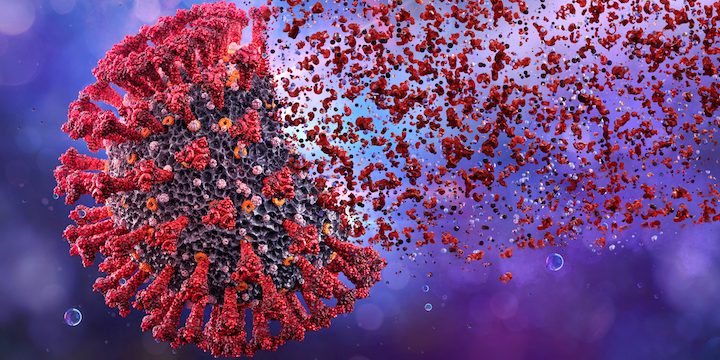Barrier gestures, vaccination, treatment… Among the tools to fight against covid-19, two hopeful drugs were cited by the Minister of Health Olivier Véran during the press conference on February 25. “These are new hopes (…) which strengthen our anti-covid arsenal“he said of them.
A new treatment authorized in France
The first is a synthetic antibody or monoclonal antibody drug. Several laboratories, such as Regeneron or Celltrion, have developed this type of treatment. In France, it is that of the American Eli Lilly who just got cleared by the Medicines Agency (ANSM) which issued a temporary authorization for use (ATU) for the patients most at risk of severe forms.
This treatment could be intended for patients over 80 years of age who have immunity disorders, transplant patients such as kidney transplant recipients, dialysis patients and patients undergoing chemotherapy.
Read also: Covid-19: update on treatments
False antibodies to mimic the real ones
This type of treatment with “monoclonal antibodies” had gained some notoriety in October, when former US President Donald Trump, briefly hospitalized for covid, had received an experimental treatment from Regeneron.
But what is it all about? These drugs contain synthetic antibodies, made and “cloned” in the laboratory. They mimic the action of antibodies, these molecules of the immune system naturally produced by the body in the event of infection.
A “monoclonal antibody” is precisely designed to recognize and target an infectious agent, here the coronavirus. Concretely, it targets the famous S protein, the surface protein of the virus, to prevent it from attaching to target cells and entering them.
Between 1,000 and 2,000 euros
The process of monoclonal antibodies is not new. They have already been used for about thirty years to treat certain cancers or certain inflammatory diseases.
Problems: this treatment is very expensive – between 1,000 and 2,000 euros -, must be administered intravenously in hospital within five days of the onset of symptoms and its effectiveness on variants of the coronavirus is not well known. Although it appears to act against the British variant, its efficacy on the South African and Brazilian variants has not been demonstrated. And for good reason: some of their mutations can allow them to escape antibodies, whether natural or artificial.
Interferon, still in the test stage
Second treatment mentioned by Olivier Véran as a bearer of hope: interferon. Here again, it is not a question of a new treatment but of a “old medicine” used for “compensate for interferon deficits“, he recalled. Interferons are proteins naturally produced by the immune system to fight an infection. This treatment, if administered to people deficient in interferons,”could limit the risk of severe forms“covid,” argued the minister.
To date, this treatment is still the subject of clinical trials and the efficacy results should be available “in a few weeks“, according to Olivier Véran.
 Cherry tomatoes contaminated with salmonella: 92 sick and 1 dead
Cherry tomatoes contaminated with salmonella: 92 sick and 1 dead  A better coaching method can make a person grow
A better coaching method can make a person grow  What is the method to prevent diabetes in children?
What is the method to prevent diabetes in children?  What are the effective factors in causing stomach ulcers?
What are the effective factors in causing stomach ulcers?  Why do embarrassing memories seem to appear at night?
Why do embarrassing memories seem to appear at night?  The amazing link between SARS-CoV-2 infection and newly started diabetes
The amazing link between SARS-CoV-2 infection and newly started diabetes  WHO says monkey pox is not a global emergency right now
WHO says monkey pox is not a global emergency right now  Single cell RNA sequencing uncovers new mechanisms of heart disease
Single cell RNA sequencing uncovers new mechanisms of heart disease  Hepatitis of unknown origin: 3 new deaths and 228 cases worldwide
Hepatitis of unknown origin: 3 new deaths and 228 cases worldwide 